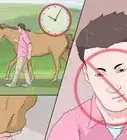This article was co-authored by Jessica Rude and by wikiHow staff writer, Danielle Blinka, MA, MPA. Jessica Rude is an Equine Expert currently working on a cutting horse ranch in Valley View, Texas as well as a horseback riding center in Princeton, Texas. Previously, she was a Trail Guide and Wrangler at a camp and retreat center In Dallas, Texas, and an Equine Breeding Barn Manager at a reining ranch in Tioga, Texas. Jessica holds a Bachelor’s degree in Animal Science with an emphasis in Equine Science from Tarleton State University. She has studied equine nutrition, reproduction, and management. Jessica specializes in equine breeding as well as instructing horseback riding lessons, leading trail rides, recognizing equine illnesses, and administering treatments.
There are 11 references cited in this article, which can be found at the bottom of the page.
wikiHow marks an article as reader-approved once it receives enough positive feedback. In this case, 80% of readers who voted found the article helpful, earning it our reader-approved status.
This article has been viewed 208,556 times.
Caring for a pregnant mare can feel like a daunting task, but it’s a worthwhile endeavor. The first thing you'll need to do is provide your mare with a comfortable, clean stall. Then, make sure you’re giving her enough food and water to accommodate her needs, as well as proper exercise. Throughout her pregnancy, she’ll need medical care to ensure a healthy foal. Finally, prepare her for the foaling in the days before her due date.
Steps
Housing a Pregnant Mare
-
1Stable your pregnant mare away from other horses, if possible. It’s best to keep her in a separate barn. This protects the horse from accidental injuries or exposure to disease. Additionally, it reduces the stress on your pregnant mare.[1]
- If you can’t keep her in a separate barn, choose the stable furthest away from the other horses.
- It’s usually safe to keep your pregnant mare near other pregnant mares who are familiar to her. It’s best if each mare is around the same point in their pregnancy.[2]
-
2Choose a large stable that provides protection. Your mare must be safe against wetness, heat and cold, as well as potential predators. Your mare will need at least 200 square feet (18.5 square meters) of space to give birth. It’s important that your mare move to her foaling stall long before the expected foaling date, as she needs to feel comfortable. If you can, house her there throughout her pregnancy.[3]
- Stress can cause your mare to lose her pregnancy, so make sure she’s as comfortable and happy as possible.
Advertisement -
3Fill the stable with long straw or hay for bedding. Spread the bedding over the floor of the stall, forming a thick layer of bedding. This helps your mare stay comfortable in her stall, plus it helps you better manage her urine and feces.
- Never use small pieces of bedding, such as wood chips. These pieces can get caught in your newborn foal’s nose. Use straw or hay from the beginning of the pregnancy so your mare will be comfortable with it by the time the foaling occurs.[4]
-
4Muck your mare’s stall twice daily to keep it clean. Remove any soiled bedding and replace it with fresh bedding. Then, empty the water bucket outside and scrub it down with your scrub brush. Refill it with clean water and return it to the stall. Finally, check that everything is in good working order.[5]
- This keeps your horse healthy and happy.
-
5Disinfect the stall a few days before the expected foaling. Remove the mare from the stall, such as by turning her out in the pasture. Then, remove all of the bedding, as well as the water bucket and feed bag or bucket. Use a mild disinfectant to clean the floor and walls of the stall. Then, rinse the entire stall and let it dry. Fill the stall with fresh bedding and return the water bucket and feed bag or bucket.[6]
- While the stall dries, scrub down the water bucket. If you use a feed bucket, you’ll also want to scrub it down.
- This ensures your foal is born into a clean, healthy environment.
-
6Avoid transporting your horse because it puts too much stress on her. You don’t want to stress the mare, as it can cause her to lose the pregnancy. Before you make a necessary transport of the mare, ask your vet to give her a check-up to make sure she’s healthy enough for travel.[7]
- If you need to transport the horse for the foaling, do it at least a month before her expected foaling date.[8]
Feeding Your Mare
-
1Expect your mare to have a lower appetite because of the foal. As the foal gets bigger, your horse will experience a smaller appetite due to the foal filling her abdomen. However, your horse needs more nutrients than ever, so feed her small, frequent meals.[9]
- If your mare doesn’t eat enough, her body will naturally start to pull nutrients from her fat stores, muscles, and bones. This weakens her, making it harder for her to care for her foal after birth.
-
2Feed your mare small meals every 2-3 hours. This helps your mare take in enough nutrients despite her reduced appetite. Feed her as much as she will eat, adjusting as necessary so you don’t wind up with soiled, wasted food.[10]
- Ask your vet for specific feeding recommendations for your mare. She may require more or less food, depending on her starting weight.
- Normally, mares will gain between 9 and 12 percent of their body weight during pregnancy. Two-thirds of the weight gain will come in the final few months, as the foal grows a lot during that time. Horses at the top of the weight range when they conceive usually need to gain less than horses that were leaner.[11]
-
3Provide your mare with plenty of grass or alfalfa throughout her pregnancy. Your horse can graze on fresh grass or eat grass hay or alfalfa. You might provide her all three but at different times of the day, since you’re feeding her every 2 to 3 hours.[12]
- The mare’s nutritional needs will remain the same as before she got pregnant until her last trimester. At about the 8th month, she’ll need additional supplements to meet her nutritional needs.
- If your mare is grazing, make sure the field is free of fescue grass, which can lead to fescue toxicity in pregnant mares.[13]
-
4Give your mare a salt-calcium-phosphorus supplement daily. In most cases, your mare won’t get enough of these nutrients through her diet alone. Giving her a supplement throughout the pregnancy can help. You can offer her a salt lick or mix the supplement into her food or water.[14]
- You can buy a supplement at your local feed store or online.
- Ask your vet which supplements are right for your horse.
-
5Provide a protein supplement starting in the 8th month of pregnancy. Your mare will need a lot of protein to ensure the health of her foal. It’s unlikely she’ll eat enough food to meet her protein requirements, but a supplement will help. The supplement often comes in pellet form, which you can add to the feed.[15]
- Look for a protein supplement at your local feed store or online.
- You can even find supplements that also contain salt, calcium, and phosphorus, as well as protein. This makes supplementing her diet even easier![16]
-
6Provide your horse with constant access to fresh, clean water. Clean and refill the bucket every morning and evening when you muck the stall. If you ever notice the bucket is empty or nearly empty, switch to a bigger bucket or add a second water bucket.[17]
- Make sure your pregnant mare has her own water source. She shouldn’t be sharing with other horses, as the water may be contaminated by their germs.
Exercising Your Pregnant Mare
-
1Minimize her exercise during the first 60 days of pregnancy. In the beginning of the horse’s pregnancy, there’s a high risk that the embryo will die or be reabsorbed. Keep the horse relaxed and minimize her activity. After the first 60 days, she can return to normal activity.[18]
- Don’t ride your horse during this time.
-
2Resume riding your horse after the first 60 days, if she allows it. It’s normal and healthy for a working horse to carry riders during pregnancy. Maintaining the mare’s normal activity level will help her have a healthier, happier pregnancy. As long she is willing to hold you, you can ride your horse.[19]
- You can ride your mare until the 8th or 9th month of pregnancy.
- If your horse shows any discomfort or resists being ridden, don’t try to mount her. Additionally, call your equine vet to get her checked out to make sure she’s doing well.
-
3Return to your mare's normal activity level for months 3-8 of pregnancy. After the first 60 days of the pregnancy, your mare doesn’t need to rest and relax. In fact, denying her exercise could lead to complications and will make your horse very unhappy.[20]
- Your horse will naturally start to slow down late in her pregnancy, so don’t worry about curtailing her activity. Let her tell you when she’s too uncomfortable for normal activity, which will happen in the 8th or 9th month of pregnancy when the foal is rapidly growing. You’ll notice that she’s slowed down and doesn’t want to be as active.
-
4Walk your mare for 15 mins 2-3 times a day during the third trimester. A paddock or pasture is the best place to walk your mare. Gently lead her at her own pace, as she’s likely to walk slowly since the foal is getting big. It’s also okay to let her self-exercise, as long as she’s in a familiar paddock or pasture.
- If you don’t have a paddock, your mare may get enough exercise just by grazing in a pasture.[21]
- Your mare will need less exercise during the final 3-4 months of pregnancy. However, she still needs to move around.
- Don’t ride your horse during the third trimester.
Providing Healthcare for Your Mare
-
1Deworm your pregnant mare every 2 to 3 months or as advised. Mares are very susceptible to worms, which can also affect the growing foal. Most dewormers are administered orally using a syringe or by mixing it into the mare’s food.[22]
- You should deworm the mare 2-3 days after the foaling to protect her milk, regardless of when her next deworming is scheduled.
- Most dewormers are safe for use on pregnant mares, but always read the label to make sure. If you have any questions or concerns, call your vet for assistance.
- If you normally deworm your mare more often than this, stick to her regular schedule.[23]
-
2Expect your vet to administer the EHV-1 (rhino) vaccine at day 90 or day 150. This vaccine protects against equine herpes virus-1, which can cause a spontaneous abortion. The earliest your vet can administer the vaccine is day 90 of the pregnancy, but they may wait until day 150, depending on the mare’s health.[24]
- Your mare will receive an EHV-1 vaccine booster on day 210 of the pregnancy to boost their protection against the virus.
-
3Administer vaccines for encephalitis and tetanus within the last 3 to 6 weeks. Your vet will vaccinate your pregnant mare against tetanus and Eastern, Western, and West Nile encephalitis. This will protect both your mare and the newborn foal, who will have a weak immune system.[25]
- Your vet will help you decide the best time to administer the vaccines to your mare. Normally, they’ll do it in the last month of pregnancy. However, they may adjust the schedule if your mare needs more vaccinations.
-
4Ask your vet if your horse needs other vaccinations in the final month. Since foals have weak immune systems, you might vaccinate your horse against other diseases in the final month. However, your vet might determine that this isn’t best for your horse. They’ll base their decision on the health of your pregnant mare, the health of your herd, and the potential for disease to spread in your area.[26]
- For example, you might also vaccinate your mare against flu, HV-4, rabies, strangles, rotavirus, and Potomac horse fever.
- If your vet decides to give your mare multiple vaccines, they may split them up. For instance, they’ll likely give the first round 6 weeks before the expected foaling and the second round 3 weeks before the foaling.
Preparing the Mare for Foaling
-
1Wash your mare with a horse shampoo a week before foaling to remove germs. Your horse needs to be clean for the foaling so that the foal doesn’t come into contact with germs or bacteria. You don’t want to risk infecting the foal. Rinse your horse with warm water, then use a clean sponge to create a lather with the soap. Rinse the soap away, then apply a conditioner if you have one. After your rinse away the conditioner, you can dry off the horse with a large towel.[27]
- It helps to wash the horse in sections. For example, you might wash the left side, followed by the right side. Then, you could wash the face and neck.
-
2Clean your mare’s udders with warm water and soap. Mix the soap into the warm water. Then, rinse your mare’s udders with warm water. Using a sponge dipped in the soapy water, gently wipe down your mare’s udders. Separate the folds on and around the udders to make sure you get them clean. Then rinse the area with warm water.[28]
- Use a light, gentle stream of water, as a hard stream of water will cause your horse discomfort.
- Your foal will be nursing on the udders, so it’s important that they’re clean.
- Use a mild soap, such as horse shampoo.
-
3Wash your mare’s genitals to protect the foal. Wet the genital area with warm water, then use a clean sponge dipped in warm, soapy water to clean the outside of her genitals. Then, use your fingers to gently turn the lower part of her labia inside out so you can remove the waxy buildup inside it. Finally, rinse the entire area with warm water.[29]
- Never, ever put soapy water in your mare’s vagina, as this can cause an infection. Only clean the outside of her labia.
- Be careful when cleaning your mare’s genitals, as she may attempt to kick you.
-
4Tie up the mare’s tail when she goes into labor so it’s out of the way. Fold the tail up so it’s shortened. Then, wrap clean plastic wrap around the tail to keep the area sanitary and hold in the hair. Secure the plastic wrap around the tail with rubber bands or additional plastic wrap. Tie it in 2 or 3 spots to make sure it won’t come loose.[30]
- Make sure your ties aren’t too tight and take down the tail shortly after the foaling. Otherwise, you might accidentally cut off circulation to the tail, which can permanently damage it.
Expert Q&A
Did you know you can get expert answers for this article?
Unlock expert answers by supporting wikiHow
-
QuestionWhat should you feed a pregnant mare?
 Jessica RudeJessica Rude is an Equine Expert currently working on a cutting horse ranch in Valley View, Texas as well as a horseback riding center in Princeton, Texas. Previously, she was a Trail Guide and Wrangler at a camp and retreat center In Dallas, Texas, and an Equine Breeding Barn Manager at a reining ranch in Tioga, Texas. Jessica holds a Bachelor’s degree in Animal Science with an emphasis in Equine Science from Tarleton State University. She has studied equine nutrition, reproduction, and management. Jessica specializes in equine breeding as well as instructing horseback riding lessons, leading trail rides, recognizing equine illnesses, and administering treatments.
Jessica RudeJessica Rude is an Equine Expert currently working on a cutting horse ranch in Valley View, Texas as well as a horseback riding center in Princeton, Texas. Previously, she was a Trail Guide and Wrangler at a camp and retreat center In Dallas, Texas, and an Equine Breeding Barn Manager at a reining ranch in Tioga, Texas. Jessica holds a Bachelor’s degree in Animal Science with an emphasis in Equine Science from Tarleton State University. She has studied equine nutrition, reproduction, and management. Jessica specializes in equine breeding as well as instructing horseback riding lessons, leading trail rides, recognizing equine illnesses, and administering treatments.
Equine Expert
-
QuestionCan my pregnant mare graze freely?
 Jessica RudeJessica Rude is an Equine Expert currently working on a cutting horse ranch in Valley View, Texas as well as a horseback riding center in Princeton, Texas. Previously, she was a Trail Guide and Wrangler at a camp and retreat center In Dallas, Texas, and an Equine Breeding Barn Manager at a reining ranch in Tioga, Texas. Jessica holds a Bachelor’s degree in Animal Science with an emphasis in Equine Science from Tarleton State University. She has studied equine nutrition, reproduction, and management. Jessica specializes in equine breeding as well as instructing horseback riding lessons, leading trail rides, recognizing equine illnesses, and administering treatments.
Jessica RudeJessica Rude is an Equine Expert currently working on a cutting horse ranch in Valley View, Texas as well as a horseback riding center in Princeton, Texas. Previously, she was a Trail Guide and Wrangler at a camp and retreat center In Dallas, Texas, and an Equine Breeding Barn Manager at a reining ranch in Tioga, Texas. Jessica holds a Bachelor’s degree in Animal Science with an emphasis in Equine Science from Tarleton State University. She has studied equine nutrition, reproduction, and management. Jessica specializes in equine breeding as well as instructing horseback riding lessons, leading trail rides, recognizing equine illnesses, and administering treatments.
Equine Expert
-
QuestionI know of a pregnant mare that is kept in a small stable and is not well cared for; I think her owner hits her and she has started to become aggressive. What can I do?
 Community AnswerCall the Humane Society of Animal Control. They may be able to either give you further instruction, or take the mare to a safer place. Before doing so, make sure that the place you call does not operate kill shelters.
Community AnswerCall the Humane Society of Animal Control. They may be able to either give you further instruction, or take the mare to a safer place. Before doing so, make sure that the place you call does not operate kill shelters.
Warnings
- Your mare may become overprotective of her foal. To prevent this, spend extra time with her before she gives birth.⧼thumbs_response⧽
- Foals can become ill much quicker than an adult horse, so make sure you’re monitoring the foal’s health. If you’re worried your foal isn’t thriving, call your equine vet immediately.⧼thumbs_response⧽
- Handle your foal often after it’s born so it gets used to human contact. Additionally, start teaching your foal how to be a well-behaved horse from the day it’s born.⧼thumbs_response⧽
- If your mare starts producing excessive milk before the foaling, call your vet immediately. This could be a sign that she’s losing the pregnancy.[32]⧼thumbs_response⧽
References
- ↑ http://csu-cvmbs.colostate.edu/Documents/expectmare-care-oct09.pdf
- ↑ https://extension.umn.edu/horse-health/caring-your-mare-during-breeding-and-foaling
- ↑ https://articles.extension.org/pages/29126/horse-foaling-management-guidelines
- ↑ https://articles.extension.org/pages/29126/horse-foaling-management-guidelines
- ↑ https://articles.extension.org/pages/29126/horse-foaling-management-guidelines
- ↑ https://articles.extension.org/pages/29126/horse-foaling-management-guidelines
- ↑ https://aaep.org/horsehealth/expectant-mare-assuring-health-and-well-being-pregnant-mare
- ↑ https://articles.extension.org/pages/29126/horse-foaling-management-guidelines
- ↑ https://www.equisearch.com/discoverhorses/feed-basics-pregnant-mares
- ↑ https://www.equisearch.com/discoverhorses/feed-basics-pregnant-mares
- ↑ https://extension.umn.edu/horse-health/caring-your-mare-during-breeding-and-foaling#nutrition-during-pregnancy-and-lactation-67060
- ↑ https://www.equisearch.com/discoverhorses/feed-basics-pregnant-mares
- ↑ Jessica Rude. Equine Expert. Expert Interview. 18 September 2020.
- ↑ https://extension.umn.edu/horse-health/caring-your-mare-during-breeding-and-foaling#nutrition-during-pregnancy-and-lactation-67060
- ↑ https://extension.umn.edu/horse-health/caring-your-mare-during-breeding-and-foaling#nutrition-during-pregnancy-and-lactation-67060
- ↑ https://www.equisearch.com/discoverhorses/feed-basics-pregnant-mares
- ↑ https://www.equisearch.com/discoverhorses/feed-basics-pregnant-mares
- ↑ http://www.livingthecountrylife.com/animals/exercising-pregnant-mares/
- ↑ http://www.livingthecountrylife.com/animals/exercising-pregnant-mares/
- ↑ http://www.livingthecountrylife.com/animals/exercising-pregnant-mares/
- ↑ http://csu-cvmbs.colostate.edu/Documents/expectmare-care-oct09.pdf
- ↑ https://articles.extension.org/pages/29126/horse-foaling-management-guidelines
- ↑ https://extension.umn.edu/horse-health/caring-your-mare-during-breeding-and-foaling#deworming-and-vaccinations-67062
- ↑ http://horsemoms.com/horse-care/pregnant-mare-care/
- ↑ https://extension.umn.edu/horse-health/caring-your-mare-during-breeding-and-foaling#deworming-and-vaccinations-67062
- ↑ https://extension.umn.edu/horse-health/caring-your-mare-during-breeding-and-foaling#deworming-and-vaccinations-67062
- ↑ https://articles.extension.org/pages/29126/horse-foaling-management-guidelines
- ↑ https://articles.extension.org/pages/29126/horse-foaling-management-guidelines
- ↑ https://articles.extension.org/pages/29126/horse-foaling-management-guidelines
- ↑ https://aaep.org/horsehealth/foaling-mare-newborn-preparing-safe-successful-foal-delivery
- ↑ http://csu-cvmbs.colostate.edu/Documents/expectmare-care-oct09.pdf
- ↑ https://articles.extension.org/pages/29126/horse-foaling-management-guidelines
About This Article
To care for a pregnant mare, keep her away from the other horses in a separate barn to prevent accidental injuries or exposure to disease. Next, fill the stable with straw or hay for bedding and be sure to muck out the stall twice daily. Then, feed the mare small meals of grass or alfalfa every 2-3 hours and give her a salt-calcium-phosphorus supplement once per day. Also, make sure the mare has constant access to fresh, clean water so she can stay hydrated. For tips on preparing a space for the mare to give birth, read on!





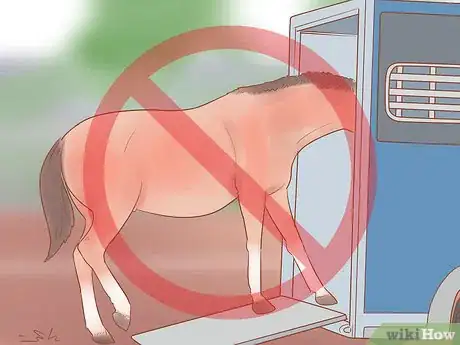
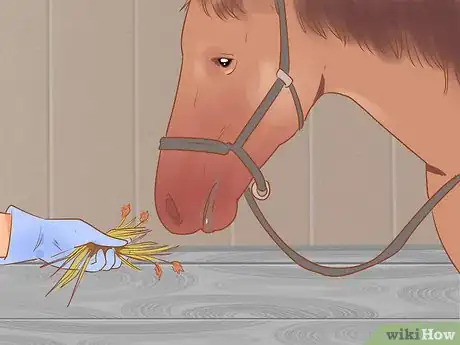
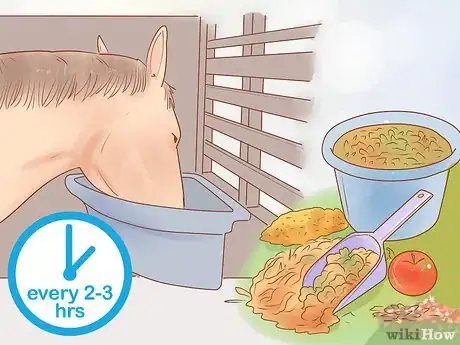
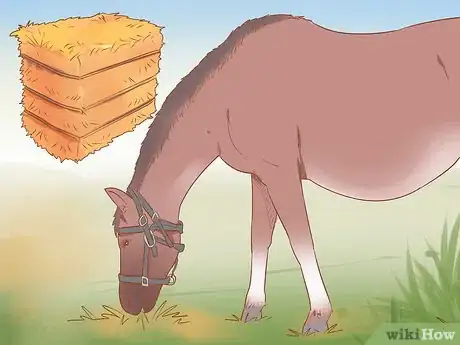

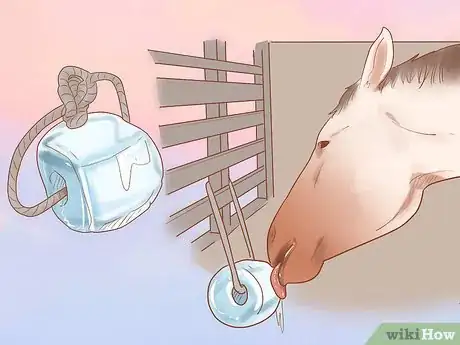
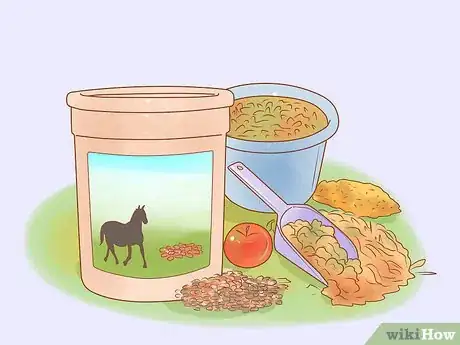
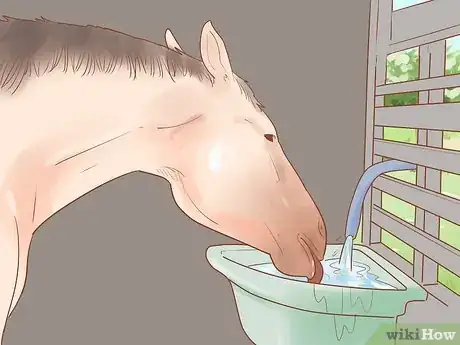


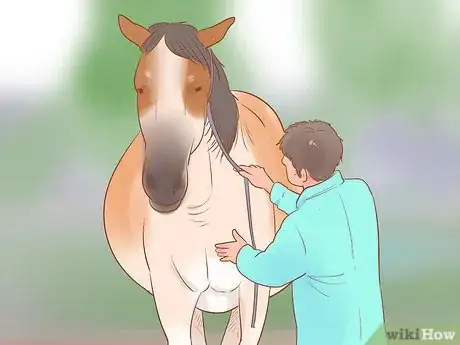
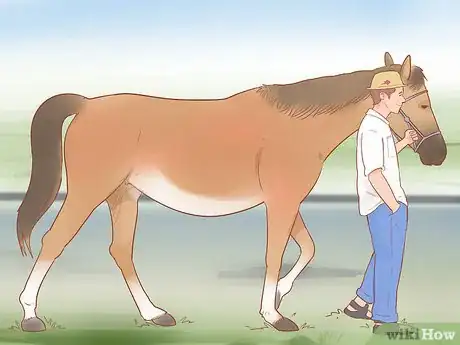
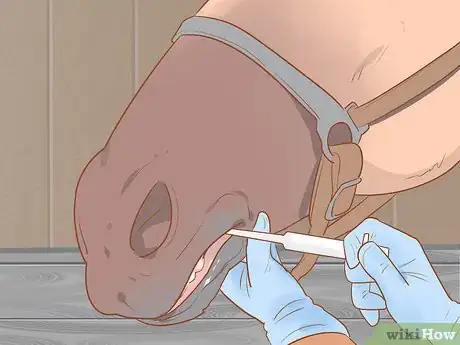
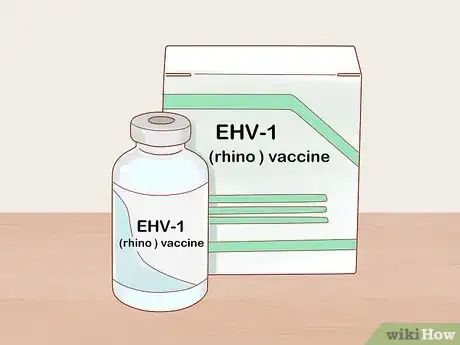
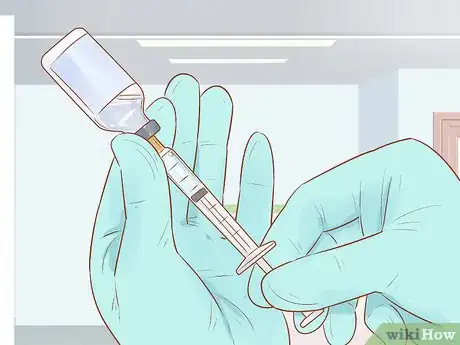
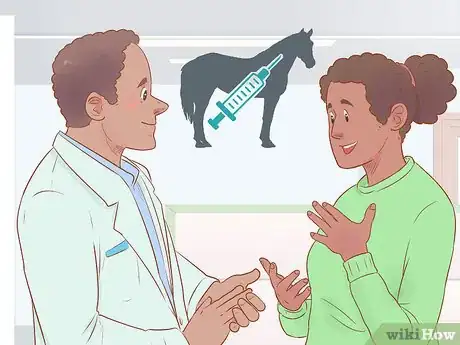
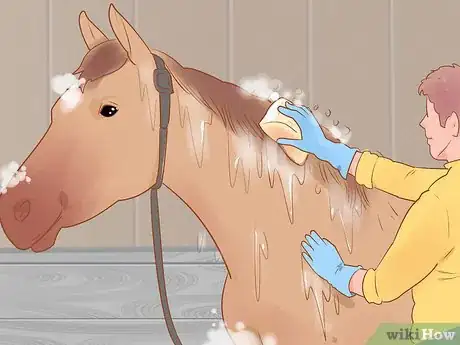
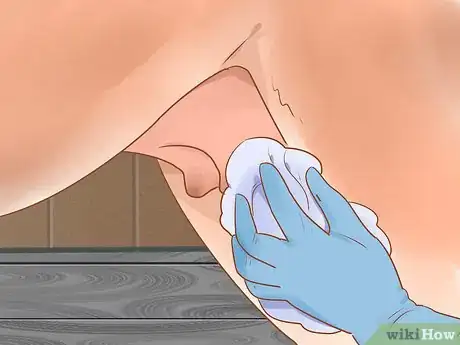
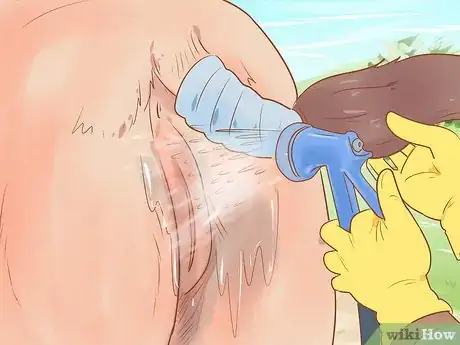
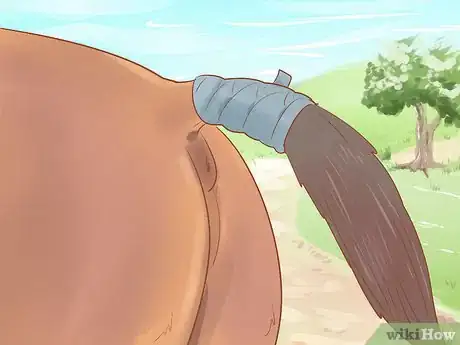





-in-Horses-Step-4-Version-2.webp)

















